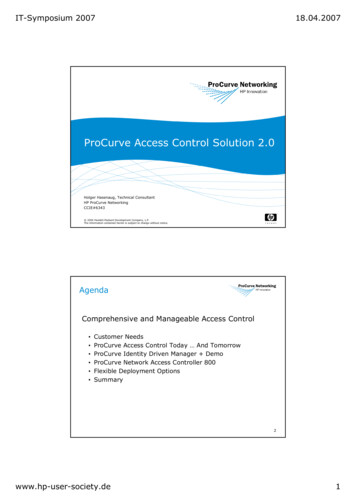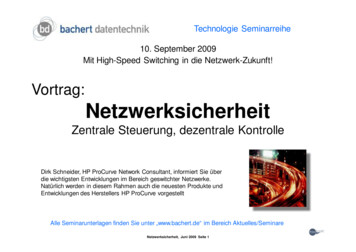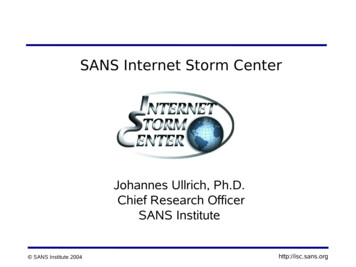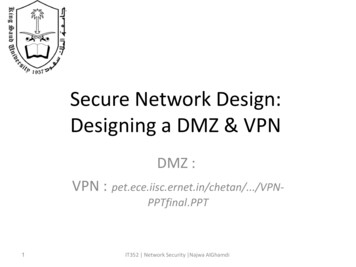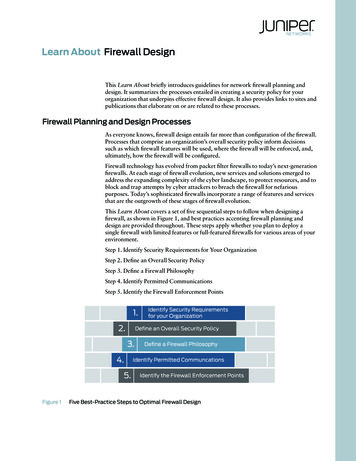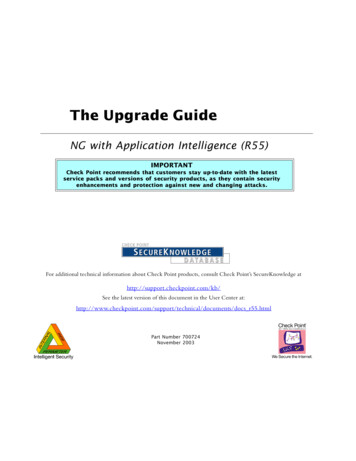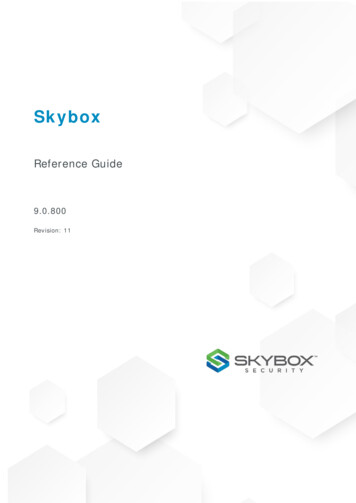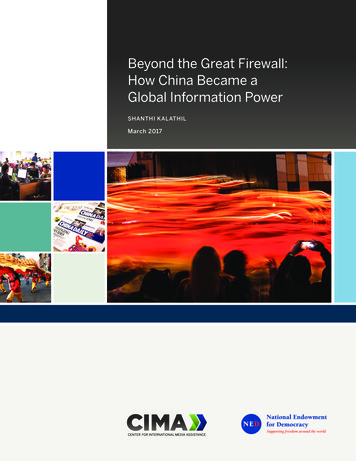
Transcription
Beyond the Great Firewall:How China Became aGlobal Information PowerSHANTHI KALATHILMarch 2017
Beyond the Great Firewall:How China Became aGlobal Information PowerABOUT CIMAMARCH 2017The Center for International Media Assistance(CIMA), at the National Endowment for Democracy,works to strengthen the support, raise the visibility,and improve the effectiveness of independentmedia development throughout the world. Thecenter provides information, builds networks,conducts research, and highlights the indispensablerole independent media play in the creation anddevelopment of sustainable democracies. Animportant aspect of CIMA’s work is to research waysto attract additional US private sector interest in andsupport for international media development.CIMA convenes working groups, discussions, andpanels on a variety of topics in the field of mediadevelopment and assistance. The center also issuesreports and recommendations based on workinggroup discussions and other investigations. Thesereports aim to provide policymakers, as well asdonors and practitioners, with ideas for bolsteringthe effectiveness of media assistance.ContentsIntroduction: Going Global. . . . . . . . . . . . . . . . . . . . . . . . . . . . 1Context: Managing Internally, Projecting Externally . . . . . 4Shaping International News:A Multi-Pronged Approach. . . . . . . . . . . . . . . . . . . . . . . . . . . 7In Its Own Image:A Chinese-Influenced Global Internet . . . . . . . . . . . . . . . . . 15Building Friendly Feelings: Hollywood . . . . . . . . . . . . . . . . 23Conclusion: An Information Age Power. . . . . . . . . . . . . . . 35Endnotes . . . . . . . . . . . . . . . . . . . . . . . . . . . . . . . . . . . . . . . . 38Center for International Media AssistanceNational Endowment for Democracy1025 F STREET, N.W., 8TH FLOORWASHINGTON, DC 20004PHONE: (202) 378-9700FAX: (202) 378-9407EMAIL: CIMA@ned.orgURL: http://cima.ned.orgMark NelsonSENIOR DIRECTORNicholas BenequistaPUBLICATION EDITORADVISORY COUNCIL FOR THE CENTER FORINTERNATIONAL MEDIA ASSISTANCEStephen Fuzesi, Jr.William A. GalstonSuzanne GarmentEllen HumeJerry HymanAlex S. JonesShanthi KalathilSusan KingCraig LaMayWilliam OrmeDale PeskinAdam Clayton Powell IIIMonroe E. PriceRep. Adam SchiffMarguerite SullivanRichard WinfieldABOUT THE AUTHORShanthi Kalathil is Director of the InternationalForum for Democratic Studies. Previously a SeniorDemocracy Fellow at the U.S. Agency for InternationalDevelopment and a regular consultant for the WorldBank, the Aspen Institute, and others, she hasauthored or edited numerous policy and scholarlypublications, including the edited volume Diplomacy,Development and Security in the Information Age (GeorgetownUniversity, Institute for the Study of Diplomacy) and DevelopingIndependent Media as an Institution of Accountable Governance (TheWorld Bank). She also co-authored Open Networks, Closed Regimes:The Impact of the Internet on Authoritarian Rule, a widely cited workthat examined the Internet and authoritarian regimes. A formerHong Kong-based staff reporter for The Wall Street Journal Asia,Kalathil is a member of CIMA’s Advisory Council, and also lectureson international relations in the information age at GeorgetownUniversity. Kalathil holds degrees from the University of California atBerkeley and the London School of Economics and Political Science.Cover: San Francisco Chinese New Year Parade, 2013, by Shawn Clover CC BY 2.0 Generic
Introduction: Going GlobalFor years, China’s adaptive and largely successful system of domesticInternet censorship, known colloquially as the “Great Firewall of China,” hasbeen held up as an example of how authoritarian regimes might—againstall expectations—successfully manage the political impact of information andcommunication technology. 1 Now well over a decade old and still evolving, theGreat Firewall has largely contained politically significant information and collectiveaction, while still allowing the vast majority of Chinese Internet users to accesstheir own social networks, entertainment, and some forms of news.But China is no longer content to simply manage the information spacewithin its borders. Without much fanfare, it has turned its focus outward,seeking to take its influence over the information environment global.Through a combination of market-oriented mechanisms, propaganda,pressure tactics, and action in international arenas, China is attemptingto harness the global information ecosystem in unprecedented ways.It has focused primarily on three avenues: shaping international newsmedia, guiding the evolution of the global Internet, and influencingglobal culture through Hollywood. The cumulative effect of this globalreach has yet to be fully dissected or understood.China’s multifaceted effort reflects a modern, nuanced comprehensionof what constitutes power in the information age. In utilizing the globalinformation ecosystem, China is certainly not alone among authoritariangovernments—Russia’s disinformation campaigns have certainlydominated more recent news cycles. But China now represents themost comprehensively successful authoritarian power in this respect,and serves as an example to others that might emulate its efforts. WhileBeijing claims it does not seek to promote its own political system,its successes can encourage other authoritarian regimes through thepower of example, which in turn can help roll back existing democraticinstitutions and ensure international institutions are not weighted infavor of democracy.2 Such efforts can have important and long-lastingeffects on democracy worldwide and on the current structure of theChina is attempting toharness the global informationecosystem in unprecedentedways. It has focused primarilyon three avenues: shapinginternational news media,guiding the evolution ofthe global Internet, andinfluencing global culturethrough Hollywood.international order.B e yo n d t h e G re a t F i re w a l l : H o w C h i n a B e c a m e a G l o b a l I n f o r m a t i o n Po w e r#mediadev1
1How ChinaInfluencesthe GlobalInformationSystemInternationalNews ReportingPressuring and influencingreporting by foreign mediaPromoting outwardfacing news media2Evolution of theGlobal InternetSupporting “constructivejournalism”Advocating for“Internet sovereignty”Promoting China’s largestInternet industries(“Internet Power”)Engaging in cyber-espionageand attacks, including useof the Great CannonShaping GlobalCulture and OpinionPartnering with Hollywoodstudios on co-productionsUsing its market power toinfluence Hollywood content3Bolstering its own entertainmentindustry capacitySupporting festivals, sports,and cultural andlanguage institutes2C E N T E R F O R I N T E R N AT I O N A L M E D I A A S S I S TA N C EC I M A . N E D.O R G
This paper seeks to shed light on this effort, looking specificallyat China’s strategies to influence three aspects of the globalinformation sphere.1. International news reporting. China’s efforts to promoteinternational news coverage favorable to its interests can be dividedbroadly into three main categories: pressuring and influencingreporting by foreign media; promulgating its own outward-facingnews media to foreign audiences; and influencing the structure andvalues of the media in countries where it has particular influence.2. The evolution of the global Internet. China, along with otherauthoritarian countries such as Russia, has been a proponent of“Internet sovereignty,” which favors authoritarian tactics to controlinformation. It has developed sophisticated cyber capabilities,and has promoted the interests of its largest Internet companiesoverseas, known loosely as “Internet Power.” This approach is likelyto undermine trust in the global Internet and limit the free flow ofinformation worldwide.3. Global culture and opinion, most significantly through Hollywood.Although China is engaged in a number of efforts to boost its culturalsoft power, such as through sports, festivals, cultural and languageinstitutes, and other venues, its engagement with Hollywood has thelargest potential reach. Because China is an increasingly importantmarket for the global film industry, entertainment firms have beenstriking deals that help give them access to that market, but putthem at the mercy of Chinese censors. This leads to content eitheredited to fit the Chinese market, or proactively shaped to excludeanything the Chinese government might consider sensitive in the firstWords like “censorship” and“propaganda” no longerconvey the breadth andambition of such endeavors.Rather, China is directlymanipulating elements ofthe information ecosystemat their source.place. Chinese co-productions are also more likely to feature positivedepictions of China.What emerges is an altered understanding of the ways in whichauthoritarian regimes like China can wield power in the globalinformation arena. Words like “censorship” and “propaganda” no longerconvey the breadth and ambition of such endeavors. Rather, Chinais directly manipulating elements of the information ecosystem attheir source, whether in the conceptual stage of Hollywood films or atthe editorial level of news reporting. The CCP has long used multiplemethods—including leverage of the private sector—to proactivelyharness information resources within China’s borders. Increasingly,those methods are being used to amplify China’s power beyond them.B e yo n d t h e G re a t F i re w a l l : H o w C h i n a B e c a m e a G l o b a l I n f o r m a t i o n Po w e r#mediadev3
Context: Managing Internally, Projecting ExternallyHistory of Controlling Information ResourcesMuch of the current discourse on China’s information-shapingcapabilities revolves around how it largely contains the political impactof information vis-à-vis challenges to the ruling Communist Party. In thelate 1990s and early 2000s, when optimism surrounding technologycompanies surged and the spread of communication technology inparticular seemed inextricably linked to the spread of freedom, itseemed inconceivable that Beijing could ever hope to manage thepolitical impact of information, particularly conveyed through whatwas then viewed as the unstoppable force of the Internet. Indeed,the dominant metaphors of the time—putting the “genie back in thebottle”—prevented serious consideration of how authoritarian statesmight still be able to control information in a digital environment. 3In truth, control of information has been central to the Party’s strategysince it first came to power. Persuasion and information managementhave always been top priorities, worthy of extensive bureaucratic andPopular state-ownedInternet media platformssuch as Pengpai show thatthis landscape can delivervital, interesting, andeven political news to anever more sophisticatedreadership—whilekeeping its audiencewithin the bounds ofacceptable discourse.financial resources.4 Under Mao, for instance, the media served the statethrough reinforcing ideological hegemony, while telecommunicationswere centralized under a powerful ministry. Since the Internet beganto spread within China, the state has maintained control of bothinfrastructure and content. Notably, it has done so through cooperationwith (or cooptation of) the private sector, allowing enough freedomto innovate and capture market share while ensuring that politicaldiscourse does not prove destabilizing. 5This does not mean that any and all politically sensitive discourse isautomatically censored or redirected. Rather, censorship is localized(usually within the corporate platforms that deliver content),internalized (so that the public has a general sense of which topicsare off limits), and distributed (within different bureaucracies andorganizations), so that management and containment mechanisms arebuilt into every feature of China’s information landscape, from Internetcontent to book publishing.6 Indeed, popular state-owned Internetmedia platforms such as Pengpai show that this landscape can delivervital, interesting, and even political news to an ever more sophisticatedreadership—while keeping its audience within the bounds of acceptablediscourse.7 These and other examples demonstrate that China’s currentinformation management techniques, even domestically, do not fitneatly within the realm of “censorship” as traditionally defined.4C E N T E R F O R I N T E R N AT I O N A L M E D I A A S S I S TA N C EC I M A . N E D.O R G
Beyond Soft PowerNearly all states seek to extend their influence through “soft power,”generally thought of as power through persuasion and attraction ratherthan power through military force. The United States, through its media,culture, economy, political system, and numerous other attributes,wields immense soft power. China, which is now the world’s secondlargest economy and boasts over 700 million Internet users as well asseveral of the world’s largest Internet companies by market value, hasbeen significantly—and deliberately—expanding its soft power. Indeed,it has learned from watching the United States, and has, over the years, pcruciatti / Shutterstockrolled out a strategy to significantly increase its soft power as a way tocarefully position China as a formidable though nonthreatening globalpower.8 As soft power scholar Craig Hayden notes, “China represents themost comprehensive utilization of resources to cultivate soft power byan international actor other than the United States.” 9This soft power strategy, championed perhaps most loudly under formerpresident Hu Jintao, continues today. Previous five-year plans haveincluded a “going global” strategy of cultural promotion, emphasizingthe need to “form public opinion powers commensurate with China’sinternational status.” 10 More importantly, perhaps, the strategy featuresbuy-in from China’s leading entrepreneurs. In a Q&A at the time of hispurchase of the leading English-language Hong Kong newspaper, theSouth China Morning Post, Jack Ma, the head of Chinese Internet giantAlibaba, also emphasized the need for China to build its soft power:“For eight centuries or more, China was a world-leading civilization withthe largest gross domestic product. Because of our isolation policy, wefell behind. China opened up again over the last three to four decades,China, which is now theworld’s second largesteconomy and boasts over700 million Internet usersas well as several of theworld’s largest Internetcompanies by market value,has been significantly—and deliberately—expanding its soft power.trying to change its system and embrace the world. The country hasmade great strides in growing its soft power and cultural influence.” 11While a component of China’s soft power strategy has long beenstraightforward propaganda, or “thought work” as it has traditionallybeen known, this official line has now been overshadowed by a widevariety of more sophisticated media, communication and cultureelements. More importantly, there is a strong component of marketbased allure and logic implicit within China’s long-term soft powerstrategy. (As some scholars note, soft power is based on perception andinferences; thus, the mere perception that China may form an importanttrading partner in the future may extend its influence in certainregions or sectors. 12)B e yo n d t h e G re a t F i re w a l l : H o w C h i n a B e c a m e a G l o b a l I n f o r m a t i o n Po w e r#mediadev5
Certainly, Chinese leaders have recognized that market-drivencommunication elements can be far more effective than stateowned organs issuing stiff proclamations. With the Party settingoverall guidelines, private companies and more market-oriented stateinstitutions have, over the past several years, developed a degree offreedom to innovate and produce products that are in line with whatglobal consumers of information and culture desire.But to describe China’s marshaling of information resources as simplysoft power does not go far enough. While not the primary focus of thispaper, China has also deployed its cyber capabilities quite effectivelyas hard-power tools. The idea of “smart power,” a combination ofboth hard and soft power, might get closer to Beijing’s execution ofits information strategy. 13 Essentially, China understands the idea thatpower is comprehensive, integrative, and multidimensional—what Chinascholar David Shambaugh calls “comprehensive power.” 14 Shambaughhas examined China’s efforts in several spheres, including perceptual,diplomatic, global governance, economic, cultural, and security. 15However power in theinformation age isultimately conceptualized,China seems to havedevised a long-termplan for accumulatingand deploying it.Notably, the global information ecosystem both undergirds andamplifies many of these spheres. However power in the information ageis ultimately conceptualized, China seems to have devised a long-termplan for accumulating and deploying it.Despite fluctuations in emphasis, this overarching framework hascontinued throughout the last several iterations of Chinese leadership,and does so even now, at a time when domestic Chinese media and civilsociety are under more severe constraints than they have been in therecent past. President Xi Jinping has assertively moved to centralize andconsolidate his power, partly through a tighter crackdown on dissent,targeting civil society and the media in particular. 16 The Party’s ownpropaganda department has not escaped scrutiny: after a two-monthinvestigation into propaganda operations, in September 2016 the CentralCommission for Discipline Inspection criticized the department for itsnews operations (which were found to be not targeted or effective) andfor insufficient leadership in ideological work. 17 At the same time, Xihas also explicitly endorsed the long-term approach: he has elevatedconcepts such as Internet sovereignty, and has said he wants Chinesemedia to “tell China’s story” to the world, a sentiment echoed byprominent Chinese entrepreneurs like Jack Ma. 186C E N T E R F O R I N T E R N AT I O N A L M E D I A A S S I S TA N C EC I M A . N E D.O R G
Shaping International News:A Multi-Pronged ApproachChina has long restricted its own journalists from reporting freely on newswithin the country. While it has focused in the past on monitoring foreign newscorrespondents within China, it has more recently beefed up its proactiveefforts to shape international media coverage of China and the issues it considersvital to its national interests. It has also worked closely with news organizations insome developing countries, particularly in Africa, to instill its own brand of journalismvalues. Here, we look at how China seeks to influence international news in threemain ways: influencing foreign reporting on China; promulgating its own viewpointinternationally through its international broadcasting and publication arms; andinfluencing the structure of news organizations through training and cooperation.Foreign Reporting: Pressures at the SourceChina has always monitored and at times harassed foreign reportersoperating within its borders. Under Xi Jinping, this practice hasexpanded. A recent PEN America report asserts that foreign journalistsin China now face more restrictions than at any other time in recenthistory (although opinions vary on how severely working conditionsfor foreign journalists have deteriorated compared to past years). 19PEN’s report also points out that Xi’s campaign to stifle dissent hasmade sources more reluctant to speak with foreign journalists, and thatChinese officials perceive foreign media as biased against China. 20Partly because of these sensitivities and perceptions of bias, thegovernment has widened its focus from monitoring foreign journaliststo broadly influencing international reporting on China (or issuesthat China considers vital to its security). As former minister of theInformation Office of the State Council Zhao Qizhang has said, “It isespecially important for us to give high priority to offering explanationsA recent PEN Americareport asserts that foreignjournalists in China now facemore restrictions than at anyother time in recent history.to the international community about matters such as the human rightsissue, the Tibetan and Taiwanese questions, the issue of religion, theFalun Gong cult question, and the theory of a ‘China threat.’” 21Hence, Beijing seeks to influence international reporting througha combination of direct action, economic pressure to induce selfcensorship by media owners, indirect pressure applied via proxies suchas advertisers, and cyberattacks and physical assaults. 22 Moreover,China uses its own system of domestic censorship as a coercion tactic,B e yo n d t h e G re a t F i re w a l l : H o w C h i n a B e c a m e a G l o b a l I n f o r m a t i o n Po w e r#mediadev7
by threatening to block access to foreign news websites as a formof retaliation.Two prominent examples from the recent past illustrate some of thesemeasures. In 2012, the Chinese government blocked the entire websites(as opposed to single pages) of both the New York Times and Bloombergin China as a consequence of those organizations reporting on financialholdings of relatives of current president Xi Jinping and former premier Bildagentur-online / Schoening / Alamy Stock PhotoWen Jiabao. As a report by Sarah Cook notes, the blocking of the Times’newly launched Chinese website resulted in financial losses for theTimes, while the website blocking plus intimidation measures (such astailing employees) seem to have deterred some of Bloomberg’s potentialbusiness partners. Both media outlets were also subject to strongpre‑publication pressure from the Chinese government, while Bloombergreportedly chose not to release an accompanying video segment to theXi Jinping article after the Chinese government expressed displeasure. 23Although it is unclear to what degree the Chinese government’s overallIn 2012, the Chinesegovernment blocked the entirewebsites (as opposed to singlepages) of both the New YorkTimes and Bloomberg inChina as a consequence ofthose organizations reportingon financial holdings ofrelatives of current presidentXi Jinping and formerpremier Wen Jiabao.efforts to influence coverage in this way have succeeded, the PEN reportpoints out that Beijing has successfully exploited the division betweeninternational media organizations’ (typically firewalled) business andnews-gathering divisions, capitalizing on companies’ desire to continueto do business in China. 24Beijing also pressures foreign media operating outside of China entirely.Since Xi came to power in November 2012, Freedom House estimatesthat China has negatively affected freedom of expression outside Chinaover 40 times in 17 different countries and institutions. 25 Beijing hasparticularly targeted overseas Chinese language media, focusing onneutralizing antagonism, increasing antipathy toward anti-governmentforces, and encouraging investment. 26 After publishing a column criticalof Chinese diplomat Wang Yi, a prominent columnist for the GlobalChinese Press (a Canadian Chinese language outlet) was told that hiscolumn was being dropped because “some people don’t want to seeyour name in the paper.” 27 China has also extended its influence over theformerly lively Australian Chinese language media space. As one analystwrote, “topics on which press discussion is forbidden in China havevanished also from the Chinese language media in our own country,”with two large pro-China media groups now controlling much of theChinese language media there. 28Hong Kong Chinese language and English language media—meant to befree from political influence after the 1997 handover of the territory fromthe United Kingdom to China—have long been seen as a test case. TheHong Kong media sector has been under pressure to toe the line in recentyears, with many experts noticing a rise in self-censorship or less critical8C E N T E R F O R I N T E R N AT I O N A L M E D I A A S S I S TA N C EC I M A . N E D.O R G
discourse on politically sensitive issues. The Hong Kong Journalists’Association issued a warning in 2016 that Hong Kong autonomy was“seriously threatened by a spillover to Hong Kong of Chinese ideologicalcontrol.”29 Cook and others note that influential Hong Kong newspapershave been bought by businesses with interests in China or close ties tomainland officials, resulting in, for instance, toning down critical rhetoricand prioritizing soft news over investigative journalism. 30In December 2015, the English-language South China Morning Post(SCMP) was bought by Jack Ma, the founder and executive chairmanof AliBaba Group, China’s (and the world’s) largest e-commerce Xinhua / Alamy Stock Photoconglomerate. At the time, Ma promised that Alibaba’s managementwould not be involved in the SCMP’s newsroom operations, and that “thepaper’s China coverage should be objective, reasonable and impartial.” 31However, since then, media analysts have raised questions about thepaper’s continuing independence, a concern that was highlighted duringan incident in which the SCMP somehow gained access to just-released,formerly imprisoned Chinese legal activist Zhao Wei, obtaining a selfdenunciation of her former activities, before even her husband and lawyerhad been able to contact her. 32 This was not the only such incident: amonth later, prominent Chinese human rights lawyer Wang Yu, who hadbeen similarly detained, re-emerged in an interview affiliated with HongKong newspaper Oriental Daily, renouncing her legal work and accusingforeign forces of attempting to smear the Chinese government. Whilesuch “confessions” by activists denouncing their former activities arenot uncommon in Chinese state media, it was unusual to see Hong Kongmedia organizations play such a prominent role. 33In December 2015,the English-languageSouth China MorningPost was bought byJack Ma, the founder andexecutive chairman ofAliBaba Group, China’s(and the world’s) largeste-commerce conglomerate.Chinese Media:Projecting Ambitiously if not SeamlesslyBut pressuring foreign news outlets is only one piece of the puzzle.Broadly, Party propaganda seeks to cultivate the image of China’sbenevolence, as a civilization and international partner. 34 Chinascholar Andrew Nathan notes that an important secondary theme ofsuch propaganda is “the upholding of the Chinese style of rule, viapolemics touting the benefits of Chinese-style socialism, identifyingCCP rule with traditional Confucian values like social harmony, andexplaining the suitability of China’s political system to China’s ‘nationalconditions’ (guoqing).” 35Thus, Beijing has also focused on amplifying China’s own voice inthe global media landscape. In doing so, it has relied on “borrowingforeign newspapers,” (jieyong haiwai baokan), which has expandedfrom cultivating relationships with foreign journalists thought to beB e yo n d t h e G re a t F i re w a l l : H o w C h i n a B e c a m e a G l o b a l I n f o r m a t i o n Po w e r#mediadev9
sympathetic to China, to placing stories directly within foreign media,often through supplements. 36 Beyond outlets owned outright by theChinese government, it can also count on the cooperation of Chinesemedia investors who share interests with Beijing. According to ReportersWithout Borders, this fits with a worldwide trend of oligarchs—usually withfriendly, and sometimes official, ties to their authoritarian governments—buying up media outlets to enrich their business interests and furthercurry political favor by slanting coverage in favor of the government. 37In the early 2000s, theParty began to more directlyfocus on creating globallycompetitive Chinese mediaorganizations, througha program of zuoqiangzuoda (“Making media bigand strong”), intended tocreate competitive globalmedia organizations.China’s propaganda strategies have now evolved in an attempt to keepup with the times. Previously stodgy and peppered with official-soundinglanguage, overseas propaganda began to transform in the 1990s: theOverseas Propaganda Department was renamed the “External PublicityDepartment” (a semantic, but telling, change). New institutions were“charged with ‘publicizing China in an authentic, colorful, lively, andtimely way’ to effectively deal with growing fears of China’s rise in powerin the 1990s,” writes Hayden. 38 Propaganda operations have now beenconsolidated within the State Council Information Office. 39In the early 2000s, the Party began to more directly focus on creatingglobally competitive Chinese media organizations, through a programof zuoqiang zuoda (“Making media big and strong”), intended to createcompetitive global media organizations.40 Beyond simply seeking toreach a global audience, Beijing also sought to target specific audiencesrelevant to its foreign policy concerns (such as in its establishment in2008 of a television channel for the countries of the Commonwealthof Independent States).41 According to Hayden, China spent nearly dpa picture alliance / Alamy Stock Photo 9 billion for international broadcasting and publicity in 2009–2010,with most of this going to China Radio International (CRI), China CentralTelevision (CCTV), the official Xinhua news agency, and the Englishlanguage China Daily newspaper. Brady points out that many availablefigures include only subsidies to media targeting foreigners, so theentire amount may be significantly larger.42These efforts vary in the extent to which they seamlessly blend into theglobal media landscape. The English language China Daily for the USmarket, for instance, has opted to place paid supplements, called “ChinaWatch,” in mainstream US newspapers like the Washington Post. ChinaWatch itself contains a fairly standard mix of sanitized content designedto reflect official Chinese positions and extoll the cultural virtues ofChina, unlikely to be confused, except by the most casual reader, withgenuine reporting by the Washington Post (recent headlines included“Belt and Road ‘beyond
Beyond the Great Firewall: How China Became a Global Information Power #mediadev 5 Beyond Soft Power Nearly all states seek to extend their influence through "soft power," generally thought of as power through persuasion and attraction rather than power through military force. The United States, through its media,


